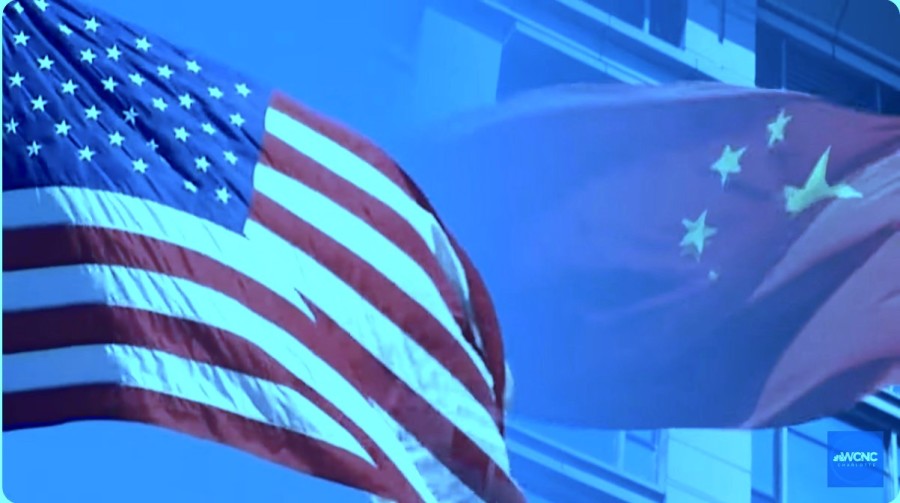U.S.-China Confrontation. (Video screenshot)
[People News] Following the Trump-Xi meeting, Trump addressed the media aboard Air Force One, describing the encounter as 'fantastic' and giving it an impressive rating of '12 out of 10', well above the perfect score of 10. Does this mean that the future of U.S.-China relations, often compared to a couple, is genuinely optimistic? Have these estranged partners truly made amends?
Su Ziyun, director of the Strategic and Resources Institute at Taiwan's National Defence and Security Research Institute, told The Epoch Times that the Trump-Xi meeting seemed relatively stable on the surface. There will be a period of stability in the Indo-Pacific conflict dynamics, and the U.S.-China trade war is expected to ease temporarily. However, he stressed that this is essentially a temporary ceasefire, with both sides displaying a 'no war' sign.
Su Ziyun further analysed that the rare earth issue will be revisited in a year, with both sides pursuing different strategies. Beijing intends to keep rare earths as a bargaining chip for future use, while the West will rapidly seek to reduce its reliance on the Chinese Communist Party for rare earths during this buffer period, including Western nations establishing their own rare earth production facilities.
According to a joint statement from the White House, after reaching an $8.5 billion agreement on critical minerals and rare earth cooperation with Australia, Trump attended the ASEAN summit in Kuala Lumpur on October 26, where he signed a series of trade agreements related to critical minerals and rare earths with Malaysia, Cambodia, and Thailand. This move aims to diversify supply chains in light of Beijing's restrictions on rare earth exports. Trump's visit clearly reflects significant strategic intentions.
Sun Guoxiang, a full-time professor at the International Affairs and Business Department of Taiwan's Nanhua University, noted that the outcomes of this meeting reflect the Chinese Communist Party's historical strategy of 'delaying tactics'. They are making concessions on low-cost, negotiable issues while stalling on core strategic matters.
Sun believes that, facing internal economic pressures and external sanctions, the Chinese Communist Party is making concessions on 'soft issues' like tariffs and agricultural products to secure temporary relief. In terms of the negotiations' substance, while Trump may seem optimistic, he should recognise that this resembles 'stopping the bleeding in stages' rather than achieving a genuine breakthrough.
According to Trump's briefing, he and Xi Jinping discussed the sales of Nvidia chips to China, but Trump clarified that the talks did not cover the sales of the latest Nvidia Blackwell chip to China.
Su Ziyun emphasised that if the United States aims to understand the strategic trends in AI, it cannot allow the Chinese Communist Party to acquire the most advanced chips. While the Chinese Communist Party has made strides in software, it remains constrained in hardware by the United States.
Prior to the Trump-Xi meeting, former U.S. Deputy National Security Advisor Matt Pottinger published an article titled 'Was Trump Played by Xi Jinping?'. Pottinger warned that U.S.-China technological and geopolitical competition is at a critical juncture, and if the sale of the Blackwell B30A chip to China is approved, it could position the Chinese Communist Party at the forefront of the tech race.
So, is it possible that Trump has truly been outmanoeuvred by the Chinese Communist Party?
Before the Trump-Xi meeting, Trump announced that he had ordered the Pentagon to resume nuclear weapons testing. Su Ziyun remarked that this action by Trump serves as a clear indication that he has not genuinely fallen into the trap set by the Chinese Communist Party.
Sun Guoxiang believes that the one-year delay in Beijing's rare earth export controls and the uncertainty surrounding the trade agreement highlight a significant level of unpredictability. He pointed out that technology, ideology, and geopolitical strategy continue to be the core contradictions between China and the United States, with both parties indulging in strategic delays. While the recent meeting between Trump and Xi may seem friendly, it functions more like a diplomatic painkiller, providing temporary relief but failing to alter the long-term dynamics of confrontation.
△










News magazine bootstrap themes!
I like this themes, fast loading and look profesional
Thank you Carlos!
You're welcome!
Please support me with give positive rating!
Yes Sure!